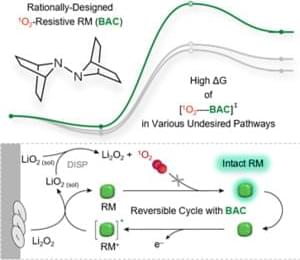A team of researchers has unveiled an innovative additive that significantly enhances the lifespan and efficiency of lithium-air batteries. This advancement, announced on Feb. 10, potentially more than doubles the driving range of vehicles compared to those using traditional lithium-ion batteries. The research was spearheaded by Prof. Kwak Won-jin from the Ulsan National Institute of Science and Technology (UNIST), in collaboration with Prof. Seo Seong-eun from Ajou University and Prof. Chen Shuming from Oberlin College in the United States.
Lithium-air batteries, known for their high energy density, use lithium as the anode and oxygen from the air as the cathode, offering up to five times the capacity of conventional lithium-ion batteries. However, these batteries face challenges due to the formation of reactive oxygen species (ROS) during operation, which can degrade battery components and reduce efficiency. The newly developed additive, a ‘redox mediator’ named BAC, addresses these challenges by maintaining a consistent charging voltage level of 3.5V, even after exposure to singlet oxygen, a particularly reactive form of oxygen.
The redox mediator, although comprising only 5% of the battery electrolyte’s weight, plays a crucial role in determining the energy efficiency and lifespan of lithium-air batteries. By reducing the voltage required for charging, the BAC mediator enhances energy efficiency and minimizes battery overload, thereby extending its lifespan. Researcher Lee Hyun-wook, the first author of the study, explained, “We were able to develop such a redox mediator through a design method that analyzes the molecular stereostructure.”
